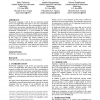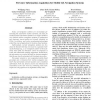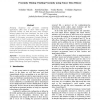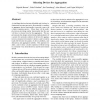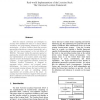112
click to vote
DEBS
2003
ACM
15 years 7 months ago
2003
ACM
Event-based computing is vital for the next generation mobile services and applications that need to meet user requirements irrespective of time and location. The event paradigm i...
WMCSA
2003
IEEE
15 years 7 months ago
2003
IEEE
WMCSA
2003
IEEE
15 years 7 months ago
2003
IEEE
126
click to vote
WMCSA
2003
IEEE
15 years 7 months ago
2003
IEEE
Today car-navigation systems are increasingly penetrating the automotive market. However, the need for location-based information systems is no longer limited to cars. Mobile outd...
147
click to vote
WMCSA
2003
IEEE
15 years 7 months ago
2003
IEEE
Emerging ubiquitous and pervasive computing applications often need to know where things are physically located. To meet this need, many locationsensing systems have been develope...
118
click to vote
WMCSA
2003
IEEE
15 years 7 months ago
2003
IEEE
1 In this work we consider the mobility of personal online identifiers. People change the identifiers through which they are reachable on-line as they change jobs or residences ...
104
click to vote
WMCSA
2003
IEEE
15 years 7 months ago
2003
IEEE
As intelligent devices become affordable and wireless infrastructure becomes pervasive, the potential to combine, or aggregate, device functionality to provide a user with a bette...
127
click to vote
WMCSA
2003
IEEE
15 years 7 months ago
2003
IEEE
Applications and services in ubiquitous computing systems often interact in a context-dependent, reactive manner. How information flows, and what services communicate when, is det...
173
click to vote
WMCSA
2003
IEEE
15 years 7 months ago
2003
IEEE
Few real-world applications of mobile ad hoc networks have been developed or deployed outside the military environment, and no traces of actual node movement in a real ad hoc netw...
111
click to vote
WMCSA
2003
IEEE
15 years 7 months ago
2003
IEEE
Both the research community and developers in industry have identified the need for a clearly defined vocabulary and programming framework for location technologies. A layered Loc...
